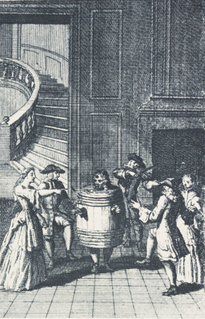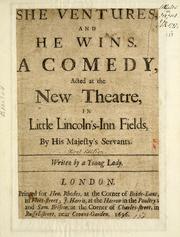
Aphra Behn was an English playwright, poet, prose writer and translator from the Restoration era. As one of the first English women to earn her living by her writing, she broke cultural barriers and served as a literary role model for later generations of women authors. Rising from obscurity, she came to the notice of Charles II, who employed her as a spy in Antwerp. Upon her return to London and a probable brief stay in debtors' prison, she began writing for the stage. She belonged to a coterie of poets and famous libertines such as John Wilmot, Lord Rochester. Behn wrote under the pastoral pseudonym Astrea. During the turbulent political times of the Exclusion Crisis, she wrote an epilogue and prologue that brought her into legal trouble; she thereafter devoted most of her writing to prose genres and translations. A staunch supporter of the Stuart line, she declined an invitation from Bishop Burnet to write a welcoming poem to the new king William III. She died shortly after.

"Restoration comedy" is English comedy written and performed in the Restoration period of 1660–1710. Comedy of manners is used as a synonym for this. After public stage performances were banned for 18 years by the Puritan regime, reopening of the theatres in 1660 marked a renaissance of English drama. Sexually explicit language was encouraged by King Charles II (1660–1685) personally and by the rakish style of his court. Historian George Norman Clark argues:
The best-known fact about the Restoration drama is that it is immoral. The dramatists did not criticize the accepted morality about gambling, drink, love, and pleasure generally, or try, like the dramatists of our own time, to work out their own view of character and conduct. What they did was, according to their respective inclinations, to mock at all restraints. Some were gross, others delicately improper.... The dramatists did not merely say anything they liked: they also intended to glory in it and to shock those who did not like it.
This article contains information about the literary events and publications of 1696.

Thomas Southerne was an Irish dramatist.

Susanna Centlivre, born Susanna Freeman and also known professionally as Susanna Carroll, was an English poet, actress, and "the most successful female playwright of the eighteenth century". Centlivre's "pieces continued to be acted after the theatre managers had forgotten most of her contemporaries." During a long career at the Theatre Royal, Drury Lane, she became known as the second woman of the English stage, after Aphra Behn.
The term she-tragedy, also known as pathetic tragedy refers to a vogue in the late 17th and early 18th centuries for tragic plays focused on the sufferings of a woman, sometimes innocent and virtuous but often a woman who had committed some sort of sexual sin. Prominent she-tragedies include Thomas Otway's The Orphan (1680), John Banks' Virtue Betrayed, or, Anna Bullen (1682), Thomas Southerne's The Fatal Marriage (1694), Mary Pix's Ibrahim, the Thirteenth Emperor of the Turks and Nicholas Rowe's The Fair Penitent (1703) and Lady Jane Grey (1715). Rowe was the first to use the term "she-tragedy," in 1714.

Restoration literature is the English literature written during the historical period commonly referred to as the English Restoration (1660–1689), which corresponds to the last years of Stuart reign in England, Scotland, Wales, and Ireland. In general, the term is used to denote roughly homogenous styles of literature that centre on a celebration of or reaction to the restored court of Charles II. It is a literature that includes extremes, for it encompasses both Paradise Lost and the Earl of Rochester's Sodom, the high-spirited sexual comedy of The Country Wife and the moral wisdom of The Pilgrim's Progress. It saw Locke's Treatises of Government, the founding of the Royal Society, the experiments and holy meditations of Robert Boyle, the hysterical attacks on theatres from Jeremy Collier, and the pioneering of literary criticism from John Dryden and John Dennis. The period witnessed news become a commodity, the essay develop into a periodical art form, and the beginnings of textual criticism.

An epilogue or epilog is a piece of writing at the end of a work of literature, usually used to bring closure to the work. It is presented from the perspective of within the story. When the author steps in and speaks directly to the reader, that is more properly considered an afterword. The opposite is a prologue—a piece of writing at the beginning of a work of literature or drama, usually used to open the story and capture interest. Some genres, for example television programs and video games, call the epilogue an "outro" patterned on the use of "intro" for "introduction".

Margaret Hughes, also Peg Hughes or Margaret Hewes, is often credited as the first professional actress on the English stage, as a result of her appearance on 8 December 1660. Hughes was the mistress of the English Civil War general Prince Rupert of the Rhine.

Mary Pix was an English novelist and playwright. As an admirer of Aphra Behn and colleague of Susanna Centlivre, Pix has been called "a link between women writers of the Restoration and Augustan periods".

Elizabeth Griffith, sometimes also credited Elizabeth Griffiths, was an 18th-century Welsh-born dramatist, fiction writer, essayist and actress, who lived and worked in Ireland.

The Duke's Company was a theatre company chartered by King Charles II at the start of the Restoration era, 1660. Sir William Davenant was manager of the company under Prince James, Duke of York's patronage. During this period, theatres began to flourish again after being closed due to restrictions throughout the English Civil War and Interregnum. The Duke's Company existed from 1660 until 1682 when it merged with the King's Company to form the United Company.
Katherine Corey was an English actress of the Restoration era, one of the first generation of female performers to appear on the public stage in Britain. Corey played with the King's Company and the United Company, and had one of the longest careers of any actress in her generation. In "The humble petition of Katherine Corey", she stated that she "was the first and is the last of all the actresses that were constituted by King Charles the Second at His Restauration."
Bellamira: or, The Mistress is a comedy by Sir Charles Sedley, published in 1687, partly modelled on Terence's Eunuchus.

She Ventures and He Wins (1696) is a comedy in five acts written by a Young Woman under the pseudonym of "Ariadne". The author, who is referred to by most documents and historians by her pseudonym, caused an uproar between the theaters of the area. Ariadne is noted as writing with humor and wit that matches that of her contemporaries. The original manuscript mentioned it was an adaptation of a "small novel", which has since been discovered to be The Fair Extravagant by Alexander Oldys, an unknown story that had been almost unheard of since its publication. Much of the plot remains the same with detail, some plot points, and characters changed. The main character in the Oldys text's name is Ariadne.
The Younger Brother, or, The Amorous Jilt is a comedy written by Aphra Behn. The play was first performed and published posthumously in 1696, but was probably written in the late 1680s.

Sir Patient Fancy: A Comedy, is a comedic play written by Aphra Behn, first performed in 1678. It is Behn's first overtly political play. It was staged by the Duke's Company at the Dorset Garden Theatre in London with a cast that included Nell Gwyn as Lady Knowell, Anthony Leigh as Sir Patient Fancy, John Crosby as Leander Fancy, Thomas Betterton as Wittmore, William Smith as Lodwick Knowell, James Nokes as Sir Credulous Easy, John Richards as Curry, Elizabeth Currer as Lady Fancy, Mary Betterton as Isabella, Emily Price as Lucretia and Anne Shadwell as Maundy.
Margaret Osborne or Osborn was an English stage actress of the seventeenth century She was a long-standing member of the Duke's Company from 1671, acting at Lincoln's Inn Fields and the Dorset Garden Theatre. She went to Dublin to work at the Smock Alley Theatre in 1677, but returned to the Duke's Company around two years later She subsequently joined the merged United Company in 1682 and was still acting in the 1690s.
Elizabeth Bowman was an English stage actor of the seventeenth and early eighteenth century. The daughter of Sir Francis Watson, 1st Baronet she was adopted by the actor manager Thomas Betterton. In 1692 she married John Bowman and began acting at Drury Lane the following year as Mrs Bowman. She was a member of the United Company until 1695 then joined Betterton's breakaway at the Lincoln's Inn Fields Theatre.
Abigail Lawson was an English stage actor of the seventeenth and early eighteenth century. She was a member of the United Company, making her first known appearance in The Marriage-Hater Matched by Thomas D'Urfey in 1692. From 1695 she was part of Thomas Betterton's breakaway company at the Lincoln's Inn Fields Theatre.












